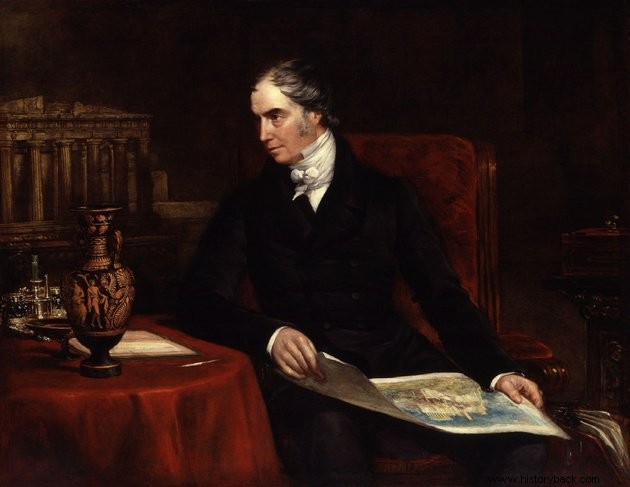The Bill Aberdeen Act was enacted on August 8, 1845 by England prohibiting the African slave trade.
In this way, the British navy pursued, intercepted and imprisoned the slave ships that transported slaves across the South Atlantic.
Once the boat was captured, the slaves were returned to Africa and landed in regions such as Sierra Leone or Liberia.
Abstract

The Aberdeen Act is named after the author of the Act, Lord Aberdeen (1784-1860), British Minister for Foreign Affairs. The full name of the law in English is Slave Trade Suppression Act ” or “Aberdeen Act ” (Slave Trade Suppression Act or Aberdeen Act).
The Aberdeen Act prohibited the slave trade in the Southern Hemisphere. In this way, any ship leaving Africa and arriving in the American continent could be intercepted by the British navy.
This resolution contributed to the creation of abolitionist laws in Brazil that aimed to free slave labor.
Under the influence of the Aberdeen Law, the Eusébio de Queirós Law was enacted, which definitively prohibited the slave trade to the country.
The imposition of England caused revolt, because some British ships even invaded Brazilian territorial waters to pursue the traffickers. Despite this, the event did not trigger a war between the countries involved.
This is because Brazil was going through economic and social crises during the reign of Dom Pedro II (1825-1891). During this period, abolitionism grew and abolitionists came together to fight slave labor in the country. In turn, the government began to control the process of extinction of slave labor.
See also:Second ReignBackground
The United Kingdom had banned slavery in its colonies in 1807 and has since been pressuring Portugal to do the same.
In this way, his aid to Portugal, during the Napoleonic invasions in 1808, was conditional on the extinction of the slave trade and slavery.
With the independence of Brazil in 1822, Dom Pedro I begins to receive the same type of pressure. Thus, the Treaty of 1826 is concluded signed by Dom Pedro I and Jorge IV, King of Great Britain.
This document proposed an end to the slave trade. However, it had no effect as the country continued to import enslaved human beings.
Read the 1st Article of this Treaty:
In the regency period, in 1831, the regent Feijó managed to pass the law that would set free any African brought as a slave to Brazil. This law would go down in history as the Feijó Law.
Disgruntled, years later England imposed the ban through the Aberdeen Act.
See also:End the African Slave TradeAbolitionist Laws
In order to abolish slavery so as not to pay damages to the owners and not to provoke a civil war, the Brazilian government enacted a series of abolitionist laws.
Eusébio de Queirós Law
After 5 years of the Aberdeen Law, on September 4, 1850, the Eusébio de Queirós Law was enacted, which prohibited the slave trade in Brazil.
With its approval, the internal slave trade between Brazilian provinces increased significantly.
The Eusébio de Queirós Law is considered one of the first steps towards the abolition of slavery, which took place in 1888, with the Lei Áurea, signed by Princess Isabel.
Before the signing of the Lei Áurea, other abolitionist laws were essential for this end to be achieved, namely:
- Free Womb Law (1871):which freed children born to slave mothers from the date onwards.
- Sexagenarian Law (1885):which freed slaves over 65 years old.
Slavery in Brazil
Remember that slavery in Brazil lasted about 300 years and was one of the last countries in America to ban this practice.
Since 1500, when the Portuguese arrived to explore the lands of America, they began to trade with the Indians. As they settled down, they enslaved them; however, they were gradually replaced by African slaves.
For many decades, Africans were the main labor force in the colony, actively participating in the country's economy.
The enactment of the Aberdeen Act was a major problem for Brazilians and Portuguese as the slave trade was very profitable for both parties.
The event caused numerous revolts among the British, Brazilians and Portuguese, who are already threatening to close the ports, places where the slaves were landed.
It is important to note that the English were inspired by the Enlightenment and economic liberalism ideals. In addition, the Industrial Revolution was emerging in the country and with it, new forms of salaried work.
Therefore, for England it was important to end the slave labor in the world, because it made production cheaper and competed with its Caribbean possessions.
The idea was to free the slaves for religious and humanitarian reasons, and also for agricultural production to be carried out equally throughout the world.
See also:Slavery in BrazilRead more :
- Abolitionism
- Enlightenment
